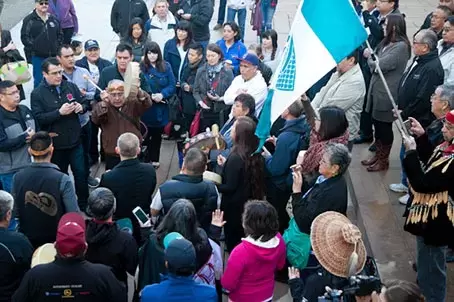Fisheries and Oceans Canada has announced it will not open the West Coast of Vancouver Island and Haida Gwaii to commercial herring fisheries.
Both areas are “below commercial fishery cut-offs and are closed to commercial fisheries for 2015/2016,” wrote Andrew Thompson, regional director, Fisheries Management, in a letter Dec. 30, 2015.
“This closure shows a willingness on the part of the Canadian government to work with Nuu-chah-nulth First Nations on a mutually acceptable framework for herring management on the West Coast of Vancouver Island,” said Nuu-chah-nulth Tribal Council President Debra Foxcroft.
Earlier that month, NTC and the Herring Industry Advisory Board signed a letter of understanding agreeing to recommend to Fisheries and Oceans Canada to close the commercial herring fisheries in 2016. That agreement was signed on Dec. 15 and delivered to new DFO Minister Hunter Tootoo on Dec. 17 by Foxcroft and NTC Vice President Ken Watts, along with Uu-a-thluk Fisheries Manager Don Hall.
The joint recommendation stemmed from the parties’ mutual concern over the low herring populations and their common interest of conservation and sustainable management. The letter urged the minister to consider local first nations knowledge of the sustainability of the resource.
In 2014 and 2015, Conservative Party Fisheries Minister Gail Shea authorized a commercial herring fishery opening for WCVI despite concerns and warnings raised by Nuu-chah-nulth about low stocks.
In early 2015, five Nuu-chah-nulth Nations turned to the federal court system to stop the commercial herring fishery opening, but did not get a favorable ruling. However, very few commercial fishermen came to WCVI and the few that did, left empty-handed. Seine vessels weren’t successful in finding any harvestable herring, reads a press statement from the tribal council.
In the summer of 2015, several First Nations in B.C. united to protect and restore marine resources and ecosystems. They signed a joint declaration committing to protect herring resources in their territories under their traditional laws.
Some coastal First Nations, including Nuu-chah-nulth, Haida Gwaii and Heltsiuk, have been opposed to commercial herring fisheries in their territories due to low abundance. Herring is of vital importance to B.C. First Nations communities and is a key factor in the sustainability of other fisheries.
“The Haida Nation is pleased to see that the new federal government is looking at herring stocks in a way that is closer to our understanding of how the natural world works,” said Peter Lantin, president of the Haida Nation in a press statement. “Their new perspective is refreshing and we hope to see it applied to other fisheries and in our government to government negotiations.”
Said NTC’s Ken Watts, “We’re pleased that DFO has also closed Haida Gwaii to a commercial herring fishery in 2016. We have always stood firm with the Haida Nation to protect our shared interest in the conservation and sustainable management of Pacific herring populations, and look forward to working with them, other groups, governments and industry to support the monitoring and assessment of stocks in the coming year.”
First Nations in B.C. say they have the right to be fully involved in decisions that have the potential to adversely impact First Nations aboriginal title and rights and they are committed to protecting, monitoring and restoring marine resources in their territories.







